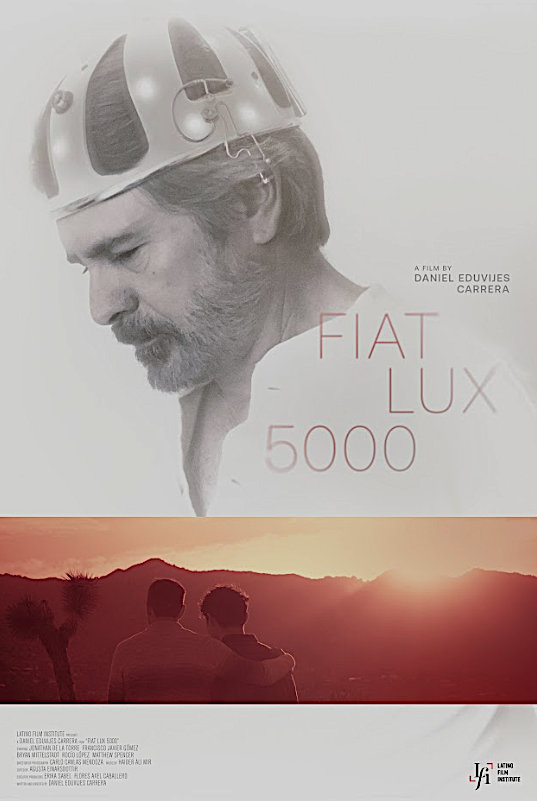By: Robert St. Martin
Los Angeles, CA (The Hollywood Times) 6/4/2024 – Dealing with an elderly person with Alzheimer’s or another type of dementia is never easy and when it is a parent, caregiving for that person can be extremely challenging in the later stages of dementia. This is a subject that film director Daniel Edjviles Carrera wanted to address in his latest short film Fiat Lux 5000.

Inspired by his own experience with an aging father whose memory seems to be fading, Carrera wrote and directed this short film to show how a devoted son attempts to grapple with the challenges of caring for his dementia-afflicted father.
Fiat Lux 5000 was one of the 14 films that screened this past weekend at the Los Angeles Latino International Film Festival (LALIFF) as part of the LFI Inclusion Fellowship, sponsored by Netflix to champion underrepresented groups within the Latinx community.
Calling on actor Jonathan De La Torre to play the devoted son Manuel Espinoza with a Mexican American father with dementia, we see immediately how his determination to be the sole caregiver for his father has upended his own life and his relationship with his boyfriend/partner.
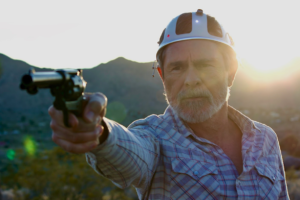
His father has a lot of pent-up anger that is still in evidence despite his failing memory and that serves as seed of the story. Manuel is become quite worn down and discouraged, taking care of his father (played by Francisco Javier Gómez) and it is Manuel’s boyfriend (Bryan Mittelstadt) who suggests an experimental brain modulation device – the Fiat Lux 5000 – that might allow Manuel to reconnect with his ailing father and the old man’s memories.
Edging into realm of science fiction, the film provides a sudden emotional burst of energy as the seemingly magical device attached to the head of Manuel’s father allows him to be the person he was some years before – making breakfast early, listening to his favorite Mexican music on his boom-box, talking nonstop about what interests him and anxious to do things with his son Manuel.
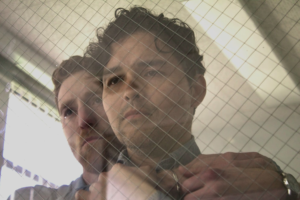
The transformative nature of the device seems to turn back time to a point where Manuel is perhaps still an adolescent and not a grown man who has found himself in a fairly stable gay relationship. This is interesting because in elderly persons with dementia, there is this tendency to recast the present as an earlier time, placing people that they know in remembered earlier versions of themselves.
While we are reveling in the sudden aliveness of Manuel’s father, there is an ominous sense that something is amiss. He recalls vividly his own childhood past in Mexico and the violence that he witnessed on a hacienda as a boy.
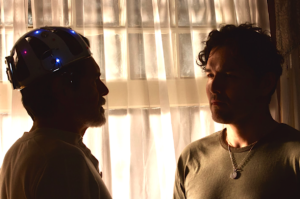
Those childhood experiences marked him deeply – as the film recaptured some of those images in old photographs. We sense that Manuel’s father developed his strong macho image from those experiences and his character shaped by violence and being a fighter.
Manuel’s father misreads his son as an adult in the present – seeing him rather as a teenager who he wants to take out to the desert to for target practice with a gun. Dementia is often accompanied by confusion of persons from the present and the past. This is where the story is headed as Manuel’s father ends up reviving a violent family legacy. Director Carrera captures the confusion of the moment and its tragic trajectory.
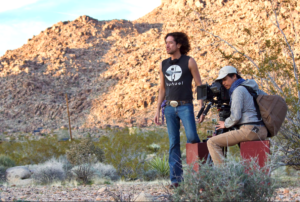
Cinematographer Carlo Canlas Mendoza has captured the emotional core of the story – often with close-ups of the faces that say much often without words. Casting De La Torre as Manuel in the film was an interesting choice given the subject and also the issue of an aging Mexican man that was at the center of the film Avivar (2023) which he wrote with director Miles Lopez and in which he played the leading roles.
Memory and the eclipse of memory serve as the common well that feeds these films. It is interesting that Latin cinema and especially films with a Mexican and Mexican American setting are so willing to stare death in the face and address the persistence of the deepest memories.
Carrera is among the most accomplished new voices in American Latino filmmaking. His work has screened at the Tribeca, Guadalajara, Morelia, Huesca and Los Angeles Film Festivals, at numerous art museums and on international television broadcasts.
He is the winner of the Imagen Foundation Award, Top Prize winner in Ovation TV’s “Search for the Next Revolutionary Filmmaker” and was recognized as Best Latino Film Director by the Directors Guild of America Student Film Awards.
His recent film El Paisa debuted at Outfest L.A. in 2023 and received a number of awards at film festivals, including most recently at Cannes Film Festival 2024, where it won Best LGBTQ+ Short Film at the American Pavilion’s Emerging Filmmaker Showcase.
Carrera was selected recently as a Fulbright Scholars in Film (Mexico/USA) and was honored with the prestigious Rockefeller Foundation/Tribeca Film Institute Media Arts Fellowship. His latest work, Soledad de Los Incendios was granted the Latino Public Broadcasting Media Content Fund and most recently, he was awarded the SFFILM/Westridge Screenwriting Grant for the development of his debut feature film, Invoking Juan Angel.


